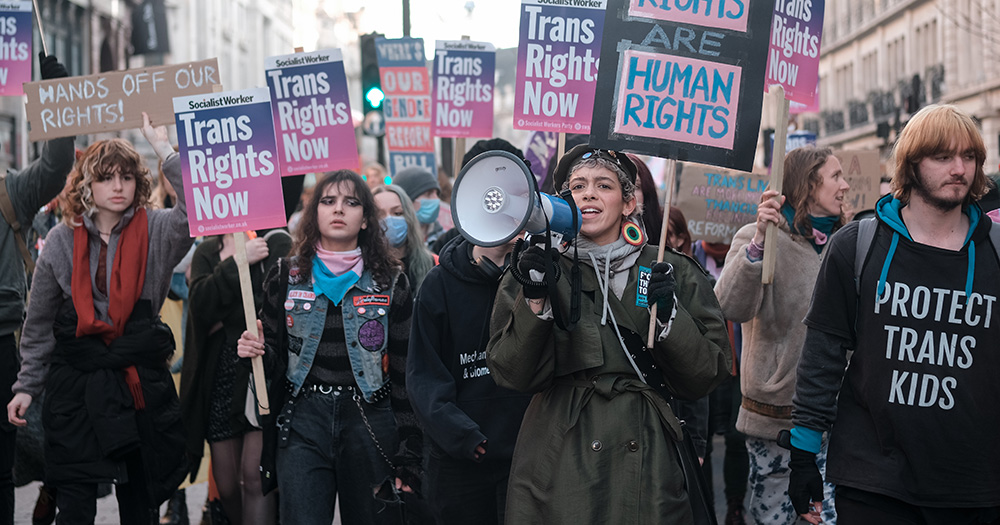The UK Supreme Court has ruled that the legal definition of ‘woman’ under the Equality Act 2010 does not include trans women who hold gender recognition certificates (GRCs). The decision was delivered on Wednesday, April 16, sparking “deep concern” from LGBTQ+ activist groups.
This comes following a protracted legal battle in Scotland, during which the Scottish government issued statutory guidance saying that the definition of ‘woman’ under the Equality Act extended to those with GRCs. With financial backing from JK Rowling, a trans-exclusionary women’s group challenged this, arguing that the protections should be granted based on biological sex at birth.
The organisation also objected to trans women being eligible for public board positions, which legislation mandates be 50% female.
While Scottish courts rejected the appeal, the case went to the UK Supreme Court, where the five judges issued a unanimous ruling in favour of the trans-exclusionary definition of ‘woman’.
View this post on Instagram
“The terms ‘woman’ and ‘sex’ in the Equality Act 2010 refer to a biological woman and biological sex,” Deputy President of the Supreme Court Patrick Hodge said. He also noted that the act contains other protections for transgender people, including against discrimination and harassment.
Hodge added: “We counsel against reading this judgment as a triumph of one or more groups in our society at the expense of another. It is not.”
However, the UK government issued a stark statement in response to the ruling, saying that it “brings clarity and confidence for women and service providers such as hospitals, refuges, and sports clubs”. It continued by saying that “single sex spaces are protected in law and will always be protected by this government”.
The Scottish government also commented, sharing that it acted “in good faith” and will work with Westminster to understand the full implications, which could be “huge”, as per Didlaw Managing Partner Elizabeth McGlone. The Scottish Greens described the verdict as “deeply concerning for human rights” and “a huge blow to some of the most marginalised people” in society.
This comes as a blow for the community, with Edinburgh-based charity Scottish Trans urging people “not to panic”.
“Please look out for yourselves and each other today,” it added.
In a separate joint statement with Scotland’s national LGBTQ+ organisation, Equality Network, the groups wrote: “We are really shocked by today’s Supreme Court decision – which reverses twenty years of understanding on how the law recognises trans men and women with Gender Recognition Certificates.
“The judgement seems to have totally missed what matters to trans people – that we are able to live our lives, and be recognised, in line with who we truly are.
“We will continue working for a world in which trans people can get on with our lives with privacy, dignity and safety. That is something we all deserve.”
View this post on Instagram
Stonewall’s CEO, Simon Blake OBE, similarly shared the charity’s “deep concern at the widespread implications for today’s ruling”.
Transgender Equality Network Ireland (TENI) also issued a statement, saying it is “dismayed” by the judgment.
“This is a step back for human rights in the UK, impacting all trans and intersex people, but particularly trans women. Any ruling which excludes and limits personal freedoms, access and participation in society, and recognition in the eyes of the law impacts us all.”
The organisation continued by stating that the verdict on the legal definition of ‘woman’ in the UK appears to support the effort to erase trans women from many sectors of society. It then issued a reminder that “without trans women, there would be no LGBTQ+ rights movement”.
“Trans women have always fought for our liberation, and the cynical rejection of trans women’s womanhood and human rights is antithetical to our collective humanity and our fight for equality and liberation.
“We are encouraged by the fact that this narrative has not made its way to Ireland, and that both the LGBTQ+ rights movement and women’s rights movements here know that trans women are women, and that trans women are valued and cherished members of our communities. The law in Ireland remains unchanged, with trans people protected under the Employment Equality Acts and Equal Status Acts. We will continue to work across all sectors to ensure that this remains the case.
“To our sisters in the UK, we send you our solidarity, and our anger,” the statement concludes.
View this post on Instagram
© 2025 GCN (Gay Community News). All rights reserved.
Support GCN
GCN is a free, vital resource for Ireland’s LGBTQ+ community since 1988.
GCN is a trading name of National LGBT Federation CLG, a registered charity - Charity Number: 20034580.
GCN relies on the generous support of the community and allies to sustain the crucial work that we do. Producing GCN is costly, and, in an industry which has been hugely impacted by rising costs, we need your support to help sustain and grow this vital resource.
Supporting GCN for as little as €1.99 per month will help us continue our work as Ireland’s free, independent LGBTQ+ media.
